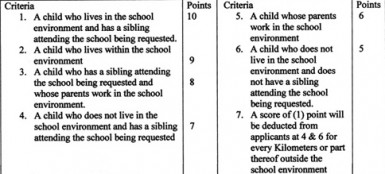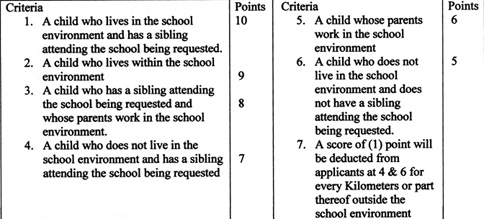Dear Editor,
From the public correspondence between Mr Freddie Kissson and I on the issue of primary school placement between 2001 and 2004, I request that you republish one of the last from me, which was written on November 15, 2004, and which is reproduced below.
I wish however to draw attention to some assertions in Mr Kissoon’s ‘In the Ministry of Education, an evil injustice goes on’ (KN, July 26).
1. Contrary to what Mr Kissoon says, the PNC did leave a six points placement system in place with defined primary school areas, which I continued to use.
2. Whatever the Ombudsman may or may not have told Mr Kissoon, the ministry did respond to him.
3. The student referred to was not given a school “ten miles away” from West Ruimveldt as Mr Kissoon claimed. The absurdity of that suggestion needs no comment, but demonstrates his reckless disregard for both the facts and his readers. The student was given St Pius, which is no more than a mile away but in the adjacent school area where places were available.
The earlier letter follows:
“Dear Editor,
“I have read absurdities and foolishness from Mr Frederick Kissoon before, but his latest contribution on the issue of school placement takes the cake. Who has ever heard of a school system that places students based upon whether or not persons are living or working “near the school”? No one in the Ministry seems able to find the document to which Mr Kissoon referred, but I hope that, since the issue under discourse took place in 2001, his document is from that period. In any case, surely, rather than accept such nonsense, Mr Kissoon should have taken such people to task.
“I can visualize an army of placement officers, busying themselves with measuring tapes, attempting to determine the children who live nearer to a given school. Had this idea of Mr Kissoon not had the potential to cause more than the usual confusion that takes place at placement periods, it would simply be laughable and I would not have felt constrained to respond…

Whether or not you have been treated fairly by the doctor would depend on what the doctor promised. Did he say: ‘I will treat everyone who arrives at my surgery before 3pm’? If so, and you arrived before 3pm and he did not treat you, then you would have been treated unfairly.
Did he say: ‘I will treat people on a first come first served basis, up to 3pm’? If so, and you arrived before 3pm but based upon the first come first served principle, 3pm arrived and he left without treating you, you were treated fairly, and so on.
“Thanks to those who existed at the Ministry of Education long before Henry Jeffrey, the placement system, with well defined environments (school areas) and criteria, is more precise and operational. The boundaries and criteria were published in 2001and are still operational.
For example, the boundaries for the West Ruimveldt Primary School’s environment are:
- East: by the Fire Station – upwards of Lots 401
- West: Public road La Penitence Lots 1-18
- Middle Road La Penitence Lots 1-150
- North: Independence Boulevard Lots 1-50 & upwards of Lots 29
- South: Riverview, Alexander Village, D’Aguiar’s Park & Meadow Bank.
The placement criteria are:
“The Ministry’s promise is that each child in a given category has an equal right to a place at the given school. The child that lives on the street opposite the school has the same right as the child living on the border of the boundary. Whether this is fair or not is simply not the point. At the time of the West Ruimveldt discussion the above was what the Ministry promised and one should not change that promise retrospectively.
“So let me repeat my 2001 statement: “… if a school area has more children than there are places at the school, since each applicant has an equal right to a place, only a process that gives each member of the group an equal chance of being selected can justifiably be utilized to select those who should be placed at the school. Yes gentlemen, if we all have equal rights or are equally qualified to have a seat in a bus, … and all of us cannot be accommodated, the random method, which gives each of us an equal chance to the available seats, … is the most fair.”
Yours faithfully,
Henry B Jeffrey





